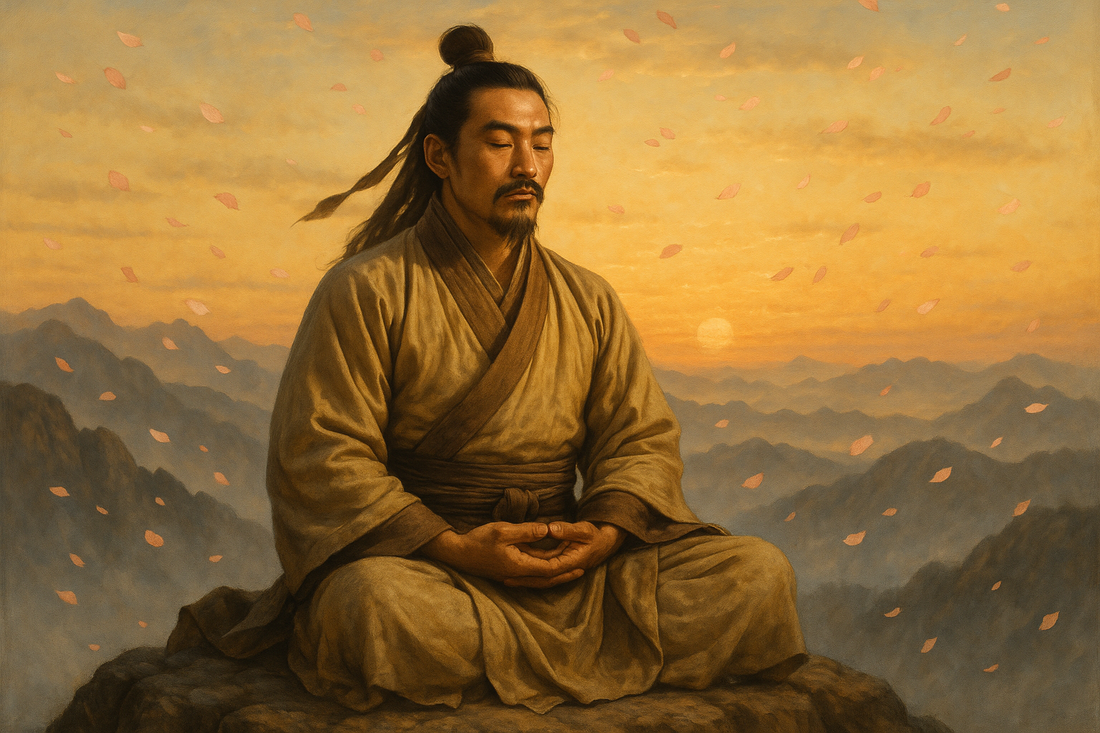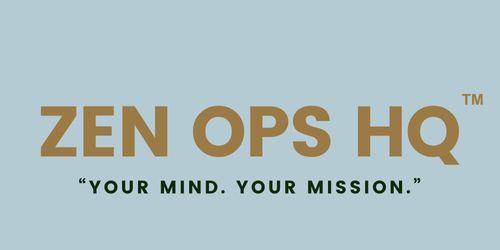
From Battlefield to Inner Peace: A Warrior's Guide to Emotional Sovereignty
For centuries, warriors have understood that the greatest battles aren't always fought on external battlefields – they're fought within the mind and spirit. At Zen Ops HQ™, we recognize that today's veterans, first responders, and caregivers face unique challenges that require more than traditional approaches. This is why we champion the concept of emotional sovereignty – the warrior's path to reclaiming control over their inner landscape and achieving lasting peace.
What is Emotional Sovereignty for Warriors?
Emotional sovereignty is the warrior's ability to govern their emotional responses, heal from trauma, and maintain inner strength regardless of external circumstances. Unlike civilian approaches to mental health, emotional sovereignty recognizes that warriors have unique experiences, training, and mindsets that require specialized understanding and tools.
For veterans who have served in combat zones, first responders who face life-and-death situations daily, and caregivers who battle against suffering and loss, emotional sovereignty means:
- Reclaiming Control: Taking charge of your emotional responses instead of being controlled by them
- Healing with Honor: Addressing trauma and PTSD while maintaining your warrior identity
- Building Resilience: Developing unshakeable inner strength that serves you in all situations
- Finding Purpose: Transforming pain into power and using your experiences to help others
The Warrior's Unique Challenge: Why Traditional Approaches Fall Short
At Zen Ops HQ™, we understand that warriors face challenges that civilians simply cannot comprehend. Traditional mental health approaches often fail because they don't account for:
- Warrior Mindset: The trained ability to suppress emotions in high-stress situations
- Hypervigilance: Constant alertness that served you in dangerous situations but creates stress in civilian life
- Moral Injury: The deep wounds that come from witnessing or participating in events that conflict with your values
- Identity Transition: The challenge of maintaining warrior identity while adapting to civilian life
- Survivor's Guilt: The weight of coming home when others didn't
These unique challenges require a specialized approach that honors your warrior experience while providing practical tools for healing and growth.
The Neuro-Spiritual Approach to Warrior Wellness
Founder Mariliz Berrios, a Neuro-Spiritual Coach who has personally navigated trauma and transformation, brings a unique understanding to warrior wellness. Her approach combines:
- Neuroscience-Based Healing: Understanding how trauma affects the warrior brain and nervous system
- Spiritual Wisdom: Drawing from ancient warrior traditions and spiritual practices
- Practical Tools: Real-world techniques that work in high-stress environments
- Warrior-Centered Approach: Honoring your service while supporting your healing journey
This integrated approach recognizes that true healing happens when we address both the neurological and spiritual aspects of trauma recovery.
The Path to Emotional Sovereignty: Five Warrior Principles
1. Acknowledge Your Battles
The first step toward emotional sovereignty is recognizing that seeking help is not weakness – it's tactical intelligence. Just as you wouldn't ignore a physical wound in combat, emotional and spiritual wounds require attention and care.
Warriors who achieve emotional sovereignty understand that addressing PTSD, anxiety, depression, or moral injury is part of maintaining operational readiness for life's ongoing missions.
2. Reclaim Your Narrative
Your story is more than your trauma. Emotional sovereignty means taking control of how you define yourself and your experiences. Instead of being a victim of circumstances, you become the author of your recovery and growth.
This doesn't mean denying difficult experiences – it means choosing how those experiences shape your future rather than letting them control your present.
3. Build Your Support Network
No warrior fights alone. Emotional sovereignty requires building a network of understanding allies – fellow veterans, first responders, caregivers, and professionals who truly understand your experience.
At Zen Ops HQ™, we believe in the power of warrior community. Connecting with others who share your experiences creates the brotherhood and sisterhood essential for healing and growth.
4. Develop Your Toolkit
Just as you maintained your equipment in service, emotional sovereignty requires developing and maintaining a toolkit of practices that support your mental, emotional, and spiritual health:
- Mindfulness and Meditation: Techniques adapted for the warrior mindset
- Breathwork: Using breath to regulate the nervous system and manage stress
- Physical Training: Maintaining the mind-body connection that serves warriors
- Spiritual Practices: Connecting with something greater than yourself
- Professional Support: Working with trauma-informed therapists who understand warrior culture
5. Serve from Strength
The ultimate goal of emotional sovereignty isn't just personal healing – it's using your strength and experience to serve others. Many warriors find their greatest healing comes through helping fellow warriors navigate their own challenges.
This service-oriented approach transforms your pain into purpose and your struggles into strength that benefits the entire warrior community.
The Valkyrie Connection: Ancient Wisdom for Modern Warriors
The Norse Valkyries understood that true warriors never stop fighting – they simply choose different battlefields. Your journey toward emotional sovereignty is a continuation of your warrior path, not an abandonment of it.
Like the Valkyries who guided worthy warriors to Valhalla, we at Zen Ops HQ™ are here to guide you toward your own hall of healing and strength. Your service has earned you a place of honor, and your healing journey is part of that honor.
Breaking the Stigma: Redefining Warrior Strength
True warrior strength isn't the absence of struggle – it's the courage to face your battles, both external and internal, with honor and determination. Emotional sovereignty redefines strength as:
- Vulnerability as Courage: The bravery to acknowledge when you need support
- Healing as Honor: Taking care of yourself so you can better serve others
- Growth as Victory: Measuring success by personal development, not just external achievements
- Connection as Power: Finding strength in community rather than isolation
Your Mission: Starting the Journey to Emotional Sovereignty
Your path to emotional sovereignty begins with a single step – the decision to prioritize your mental, emotional, and spiritual health with the same dedication you brought to your service.
At Zen Ops HQ™, we're committed to supporting you on this journey with:
- Warrior-Specific Resources: Tools and techniques designed for your unique needs
- Community Support: Connection with fellow warriors who understand your experience
- Professional Guidance: Access to trauma-informed professionals who honor your service
- Ongoing Education: Continuous learning about healing, growth, and resilience
The Continuing Mission
Remember, achieving emotional sovereignty isn't a destination – it's an ongoing mission. Like physical fitness, it requires consistent attention, practice, and commitment. But the rewards are immeasurable: inner peace, stronger relationships, renewed purpose, and the ability to serve others from a place of strength rather than struggle.
Your service to others was honorable. Now it's time to serve yourself with the same dedication and commitment. You've earned the right to peace, healing, and happiness. Emotional sovereignty is how you claim that right.
At Zen Ops HQ™, we salute your service and support your journey toward emotional sovereignty. You've fought for others – now let us help you fight for yourself. Because every warrior deserves to find peace after the battle, and every hero deserves to heal with honor.

